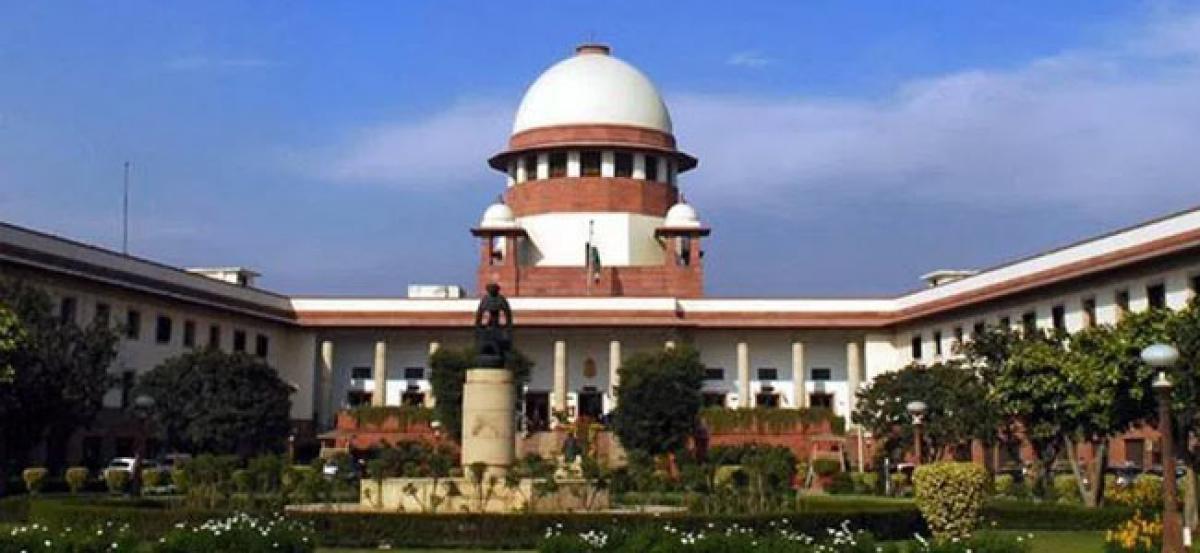Live
- Basavanagudi Kadalekai Parishe: Govt gives good news to groundnut traders
- Yanamala blames YSRCP policies for collapse of state economy
- Call to inculcate habit of reading books
- 63% parents give milk to their kids to maintain intake of calcium
- Maoist Leader Manjula Surrenders in Warangal, Receives ₹20 Lakh Reward
- Kartika Purnima celebrations fervour marks Telugu States, devotees flock to shiva shrines
- YSRCP alleges meagre fund allocations for Super Six schemes
- Telangana CM Reviews Plans for First Anniversary of State Government
- Vijayawada: Kindness Day celebrated
- Rajamahendravaram: Students advised to set clear goals
Just In

The Supreme Court on Wednesday agreed to consider if its 11-year-old judgement dealing with the issue of application of the \'creamy layer\' for reservation to SC and ST categories in promotion in government jobs needs to be revisited.
NEW DELHI: The Supreme Court on Wednesday agreed to consider if its 11-year-old judgement dealing with the issue of application of the 'creamy layer' for reservation to SC and ST categories in promotion in government jobs needs to be revisited.
The top court said that a five-judge Constitution bench will examine the limited issue as to whether the 2006 verdict delivered in M Nagaraj and other versus Union of India was required to be re-looked at or not.
A bench of Chief Justice Dipak Misra and justices AK Sikri and Ashok Bhushan clarified that it was not going into the correctness of the verdict.
The M Nagaraj verdict had said that the creamy layer concept cannot be applied to the Scheduled Castes and Scheduled Tribes for promotions in government jobs like two earlier verdicts of 1992 Indra Sawhney and others versus Union of India (popularly called Mandal Commission verdict) and 2005 E V Chinnaiah versus State of Andhra Pradesh, which dealt with creamy layer in Other Backward Classes category.
The apex court was hearing a batch of petition which arose from a Bombay High Court order quashing two state government resolutions terming them as ultra vires to Article 16(4A) of the Constitution of India.
Several other states have also approached the apex court on the issue.
The Maharashtra government, through its resolution in 2004, had granted reservation to Scheduled Castes, Scheduled Tribes and De-Notified Tribes, Nomadic Tribes, Special Backward Category and Other Backward Classes in job promotion.
The issue cropped up as a bench of Justices Kurian Joseph and R Banumathi had referred a matter to the Constitution bench which also related to creamy lawyer for reservation of SC/ST in government jobs.
The two-judge bench had said that clarity was required on the applications in creamy layer in situation of competing claims within the same races, communities, groups or parts thereof of SC/ST communities notified by the President under Articles 341 and 342 of the Constitution.
The bench had sought clarification on Article 16(4), 16 (4A) and 16(4B) of the Constitution of India, which deals with the power of state government to make provisions for reservation of appointments or posts in favour of any backward class of citizens which, in the opinion, was not adequately represented in the services under the state.
The Nagaraj verdict had reiterated that the ceiling-limit of 50 per cent, the concept of the creamy layer and the compelling reasons, namely, backwardness, inadequacy of representation and overall administrative efficiency were all constitutional requirements without which the structure of equality of opportunity in Article 16 would collapse.
It had further said that the state was not bound to make reservation for SC/ST in matter of promotions.
"However, if they wish to exercise their discretion and make such provision, the State has to collect quantifiable data showing backwardness of the class and inadequacy of representation of that class in public employment in addition to compliance of Article 335," the five-judge constitution bench had said in its 2006 judgement.
It had also clarified that even if the state has compelling reasons, as specified, the state would have to see that its reservation provisions does not lead to excessiveness so as to breach the ceiling-limit of 50 per cent or obliterate the creamy layer or extend the reservation indefinitely.

© 2024 Hyderabad Media House Limited/The Hans India. All rights reserved. Powered by hocalwire.com







